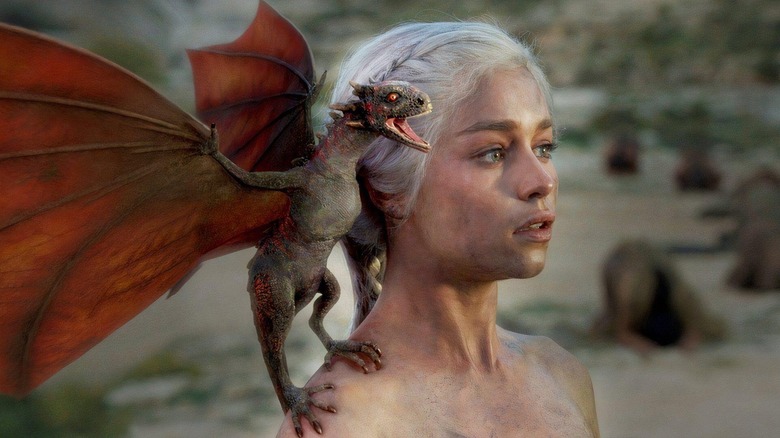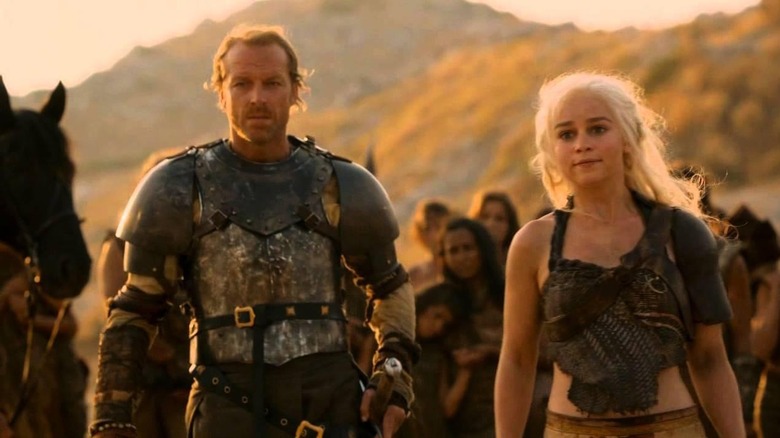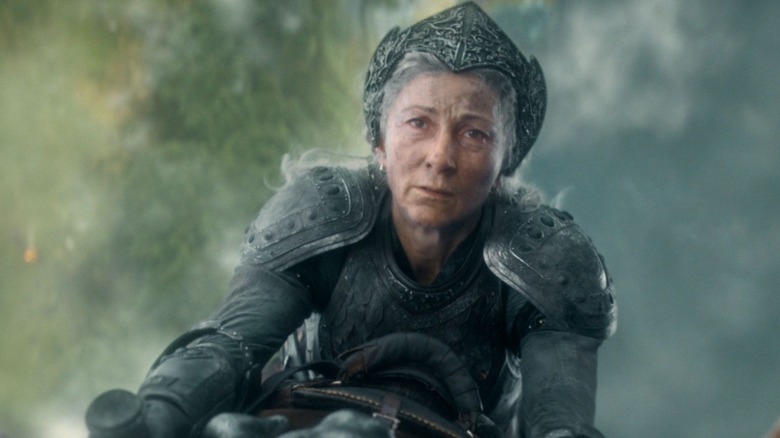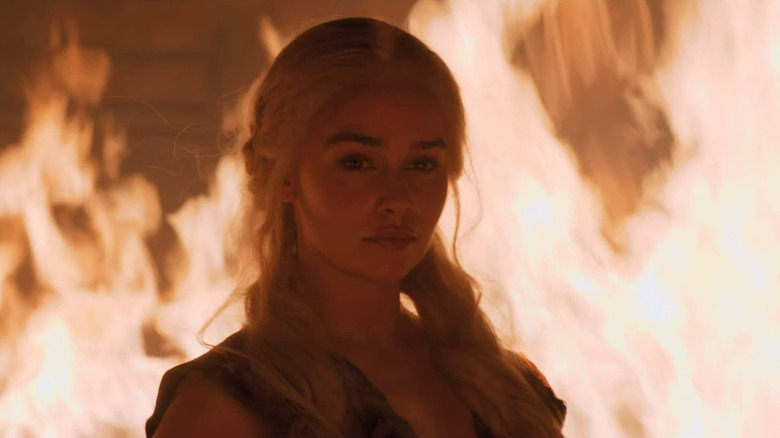Why Is Daenerys Targaryen Immune To Fire In Game Of Thrones?
The first season of "Game of Thrones" plays it slow and steady with the magic. Yes, the opening scene introduces ice zombies, but the rest of the season is focused on medieval-esque political worldbuilding. It's easy to wonder if those dragons we keep hearing about ever even existed, or if any of those gods the characters worship are even real. But by the end of the first season it's been made clear that this is a true fantasy show: Daenerys (Emilia Clarke) awakens her three dragons, which she'll use to burn down countless enemies throughout the rest of the series.
How does Daenerys pull this off? Well, she walks through fire. She spends the entire night surrounded by flames, and rises from it unscathed. Even her hair remains untouched, which is strange considering her clothes burned so easily. In the books Daenerys' hair did burn, and she spent the next two books slowly regrowing her silver hair to its former glory; I guess the TV show didn't have the budget for so many wigs.
Ever since this scene, fans have wondered why Daenerys is immune to fire. If it's just because she's a Targaryen, why aren't other known Targaryen characters also immune? There are a few other Targaryens throughout the "ASOIAF" universe who've been established as being at least mildly heat resistant — mainly Aegon V from the "Dunk and Egg" tales, who Dunk remarks prefers to take baths in scalding hot water — but even Aegon ended up dying via dragonfire. So what makes Daenerys so special?
Worth noting: book Dany is different from TV Dany
In the books, Daenerys isn't immune to fire either, and we can see that on display in "A Dance With Dragons" where she suffers a minor burn from Drogon's breath. As for the big scene in the first book where she emerges from the flames with her new baby dragons? The author, George R. R. Martin, has made it clear this was a one-time thing. "TARGARYENS ARE NOT IMMUNE TO FIRE!" Martin said in a 1999 Q&A. "The birth of Dany's dragons was unique, magical, wondrous, a miracle. She is called The Unburnt because she walked into the flames and lived. But her brother sure as hell wasn't immune to that molten gold."
Martin added that Dany probably wouldn't be able to pull off that sort of feat again, so there's a good chance her interactions with the Dothraki in the upcoming book, "The Winds of Winter," will play out differently than it did in the show. ("WoW" is coming out any day now, we're sure.) This change makes sense given the series' general thematic musings on Targaryen hubris. The Targaryens are special, sure, but they're not that special; making it so Dany is not as fire-resistant as everyone assumes has gone a long way in casting reader doubt on her grand plans of leadership.
Meanwhile, the TV show establishes that Dany is basically a superhero when it comes to fire, on par with the Night King in her invincibility. It's a little easier in the show to believe that Dany was chosen by some divine being, which only makes that ending sting even more.
In the shows and the books, some Targaryens are tougher than others
There's a saying in Westeros about how when a Targaryen is born the gods flip a coin. The saying usually refers to the Targaryens' capacity for evil, but it can also apply to how well they can handle heat. In the show, for instance, we see Daenerys' brother Viserys (Harry Lloyd) get burned from hot bathwater. (And of course we see him die from the melted crown, although I don't think even Daenerys in the show could've survived that.) The show seemed to use resistance to fire to foreshadow which Targaryen sibling was true regal material, and which of them was doomed to fail.
In "House of the Dragon," we can see a similar technique on display. In the season 2 dragon battle between Rhaenys (Eve Best) and Aegon II (Tom Glynn-Carney), there's a ton of fire involved. But Rhaenys only dies from the impact of her fall, not the flames themselves. There's a decent argument to be made that Rhaenys, who would've been a much better queen than any of the kings we see in this show, is at least somewhat immune to fire. Meanwhile with Aegon II, a childish pretender who the show doesn't want us to root for, he clearly can't handle the heat. Aegon ends up burned so badly he'll be scarred and disabled for life.
In other words, the more worthy a Targaryen is to rule, the more heat-resistant the show (and books, to a lesser extent) will portray them. The only major exception is Jon Snow, a guy who's portrayed as a natural leader but who nevertheless burns his hand badly in season 1. The reason for this seems obvious, though: making Jon immune to fire would've given away the R+L=J twist. So the show's implicit pattern of "the better the Targaryen, the better they can handle fire" is more of a general guideline than a hard rule.
Why'd the showrunners choose to make Dany immune to fire?
What's strange about Show Dany's immunity is that it goes against the show's usual tendency to downplay the source material's magic. The books go way more into the Starks' ability to warg into their direwolves, for instance, whereas the show drops that thread almost entirely.
The "Game of Thrones" showrunners haven't spoken much on the topic, but the obvious answer here is that Daenerys' fire powers are the sort of thing that translates uniquely well to a visual medium. Daenerys calmly walking out of the flames in season 6 is cool and makes for some iconic imagery, whereas Arya and Jon having dreams from their direwolves' perspectives likely won't have the same cinematic impact.
It could also be another case of the adaptors streamlining the source material. It would take up valuable screentime to explain to the audience that Dany's immunity was just a one-time thing, so the writers didn't clarify and let the misconception of Dany's immunity build up further on its own. Then in season 6, leaning into Dany's fire immunity helped them to blunt-force rip open the infamous Meereenese Knot that has slowed down the books' publication so much. GRRM has famously struggled with how to resolve Dany's situation in Meereen in a satisfactory way so that she can finally head over to Westeros and finish the series. But whenever the show had Dany trapped in a sticky narrative situation, burning it all down was always an option.



